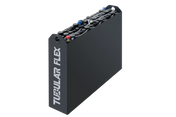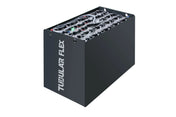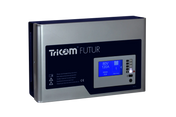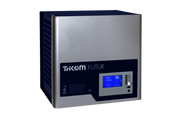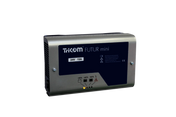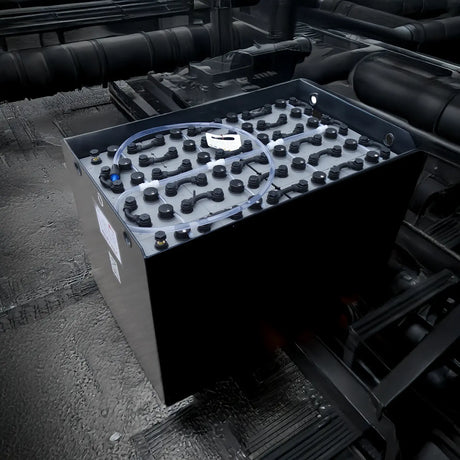Combining a photovoltaic system with a forklift battery offers a cost-effective way to efficiently store solar power and significantly increase self-consumption. This guide explains how forklift batteries work as a storage solution, what technical requirements apply, and how you can realistically assess their cost-effectiveness.
Why a forklift battery makes sense as a storage battery for the solar system
Forklift batteries were originally designed for continuous industrial operation. Their robust construction, high cycle count, and large storage capacity also make them attractive for photovoltaic applications. They store excess solar power, which can be used later when sunlight is less intense.
Optimizing self-consumption is particularly economically attractive for systems without feed-in tariffs. A used forklift battery can make the transition to energy storage significantly more cost-effective.
Technical basics and capacity calculation
Voltage and capacity
Forklift batteries are usually available in 24 V, 48 V, or 80 V versions. Capacity is measured in ampere-hours (Ah). To calculate the theoretical energy, multiply voltage and capacity:
Example: 48 V × 500 Ah = 24 kWh gross capacity. Of this, approximately 50–60% is usable for lead batteries (12–14 kWh), and up to 100% for lithium systems.
Size, weight and space requirements
A typical 48 V forklift battery weighs 800–1,000 kg. This means it requires a solid, stable, and well-ventilated location—preferably away from living spaces. The ambient temperature should be between 15°C and 25°C.
Efficiency and charging losses
The efficiency of lead-acid batteries is 70–85%, while lithium-ion systems reach 90–98%. Lead batteries experience charging losses due to gassing, which is why the battery requires regular maintenance and ventilation.
Comparison of service life and cycle numbers
Forklift batteries are designed for cyclic operation, but due to their chemistry, they achieve fewer cycles than lithium systems. Their service life depends on the depth of discharge, temperature, and maintenance.
| criterion | Lead-acid forklift battery | Lithium-ion battery (LiFePO4) |
|---|---|---|
| Number of cycles | 1,200–2,500 (at 50% depth of discharge) | 3,000–7,000 (at 80% depth of discharge) |
| life | 5–10 years | 10–20 years |
| Efficiency | 70–85% | 90–98% |
| maintenance | regularly (water, acid density) | virtually maintenance-free |
| Weight | 800–1,200 kg / 10 kWh | 80–120 kg / 10 kWh |
Maintenance and safety of lead batteries
Lead-acid forklift batteries require regular maintenance. Distilled water should be added monthly and the acid specific gravity checked. Equalizing charges are also necessary to prevent sulfation.
Danger from hydrogen gas
During charging, hydrogen gas is released, which can ignite if ventilation is inadequate. This explosion hazard is the most important safety consideration for lead-acid batteries. Therefore, only install the battery in well-ventilated, fireproof rooms.
Important NOTE:
Repairs or cell replacement should only be performed by specialized companies. Handling sulfuric acid requires protective clothing and specialist knowledge. DIY repairs are not recommended for laypersons.
Cost comparison: Lead vs. Lithium
The biggest advantage of forklift batteries is their price. Used lead batteries, in particular, are significantly cheaper than new lithium systems.
| criterion | Lead-acid (used) | Lead-acid (new) | Lithium-ion |
|---|---|---|---|
| Acquisition costs €/kWh | 100–200 | 200–400 | 400–800 |
| Total cost of ownership (TCO) | ✓ cheap | ✓ medium | ✗ high |
| Maintenance effort | medium | medium | small amount |
| Recycling value | 0.30–0.50 €/kg (depending on market price) | 0.30–0.50 €/kg | free return (EU) |
Example calculation for profitability
A used 48 V/500 Ah forklift battery (approximately 24 kWh gross, 12 kWh usable) costs approximately €2,000. A comparable lithium battery costs around €8,000. At an electricity price of €0.35/kWh and 2,000 kWh of self-consumption, the lead-acid battery saves approximately €700 annually. This means it pays for itself in about three years – assuming the battery lasts for six to eight years.
Funding, registration and insurance
The previous KfW 275 subsidy program has expired. Currently, KfW 270 offers low-interest loans for PV storage systems. Some federal states (e.g., Bavaria, North Rhine-Westphalia) also provide additional support for storage systems. Contact your state energy agency for information about current programs.
Obligation to register with the network operator
Every PV system with storage must be registered with the responsible grid operator. This also applies to self-installed storage solutions with forklift batteries. Failure to register may jeopardize insurance coverage and result in fines.
Insurance aspects
Inform your building insurance company about the additional battery storage. Depending on your insurance, the fire load and installation location may be relevant. Lead batteries may have to meet special requirements due to their weight and gassing.
Installation and integration into PV systems
Inverter compatibility and manufacturer recommendations
Choose an inverter suitable for the battery voltage. Proven manufacturers include Fronius, Victron Energy, SMA, Studer, and Kostal . Many hybrid inverters can work directly with 48 V batteries. For 80 V systems, a DC-DC converter may be required.
An optional battery management system (BMS) supports monitoring of voltage, temperature and state of charge – particularly important for self-built storage systems.
Installation location and safety
Forklift batteries should be installed on a fireproof, level surface and secured against tipping. Maintain minimum clearances from flammable materials. The environment should be dry, frost-free, and well-ventilated.
Comparison: Lead-acid vs. lithium-ion
Both technologies have strengths and weaknesses. Which is better depends on budget, willingness to maintain, and space.
| criterion | Lead-acid forklift battery | Lithium-ion battery |
|---|---|---|
| Acquisition costs | ✓✓ Very affordable | ✗ High |
| life | ✗ Shorter | ✓✓ Longer |
| Maintenance effort | ✗ Regularly | ✓ Maintenance-free |
| Efficiency | ✗ 70–85% | ✓ 90–98% |
| Weight / space requirement | ✗ High | ✓ Compact |
| Fire risk | ✓ Low (with proper ventilation) | ✓ Low (LiFePO4) |
| Disposal | ✓ Recycling value | ✓ Free returns |
Realistically assess fire risk
The fire risk from battery storage is very low. According to Fraunhofer ISE, only 10 fires (0.008%) occurred in over 130,000 PV systems. Installation errors are usually the cause. Both technologies are safe when installed properly – however, lead can release hydrogen if overcharged, which can ignite. Therefore, ventilation is mandatory.
Environmental aspects and recycling
Both battery types are subject to the EU Battery Regulation. Manufacturers have been obligated to take them back free of charge since 2025. Lead batteries are recycled at over 95%, while lithium systems are currently recycled at 70–80%, with the rate increasing. The recycling value of lead batteries is €0.30–€0.50/kg, but fluctuates with the global market price for lead.
Checklist for your purchase decision
- What is my daily electricity consumption (kWh)?
- How much solar power do I want to use myself?
- Do I have enough space and ventilation for a forklift battery?
- Am I willing to perform regular maintenance (water, acid density)?
- Is my inverter compatible with 24 V, 48 V or 80 V?
- Has the system been registered with the network operator?
- Is my insurance company aware of the storage?
- Have I taken transport and recycling costs into account?
Alternative: Power storage from car batteries?
Car batteries are designed for starting, not for cyclic discharge. Therefore, they are unsuitable for PV storage. Forklift batteries, on the other hand, are designed for repeated charging and discharging and are significantly more durable.
Conclusion: Affordable entry into solar power storage
Forklift batteries are a robust and economical solution for anyone who wants to harness solar power without making large investments in lithium systems. While they require more maintenance and space, they offer an attractive way to reduce energy costs and increase grid independence.
At HK Handels GmbH, you will find used and new forklift batteries for photovoltaic systems – in various voltages and capacities, professionally tested and ready for use.


